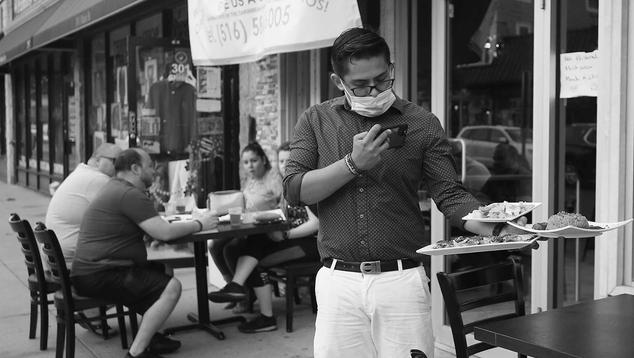Story Highlights
- Most Americans still practice social distancing, wear face masks
- The partisan gap in self-reported preventive health practices is widening
- Conservative news diet tied to less social distancing, face mask usage
WASHINGTON, D.C. -- Most Americans continue to embrace practices to prevent the spread of the coronavirus. Yet, a partisan gap in attitudes and self-reported behaviors has existed since March and is growing larger. A significant contributor to this widening gap seems to be Americans' news media diet (determined by the top news sources people use) -- lending support to the thesis that public health issues have become the newest extension of an ongoing culture war waged daily by partisan news outlets.
These results, based on data collected March 16 to June 14, come from Gallup's daily COVID-19 tracking survey, which includes interviews with members of Gallup's probability-based panel.
Broad Consensus in COVID-19 Preventive Practices
Between June 8 and June 14, 84% of U.S. adults said they had worn a face mask outside their home in the past seven days. Seventy percent reported having practiced social distancing "always" or "very often" in the past 24 hours, and 67% said they thought the better advice for people who do not have COVID-19 symptoms is to stay home as much as possible (rather than resume their normal lives). While Americans share common ground on these issues, these results are only a snapshot in time. These attitudes and behaviors have evolved in different ways.
- Face mask usage increased substantially in April and continued climbing more gradually in May.
- Social distancing peaked in early- to mid-April and has declined steadily since then.
- Meanwhile, an increasing percentage of Americans say people who do not have symptoms and are otherwise healthy should lead their normal lives as much as possible to avoid interruptions to work and business -- but a majority still say healthy individuals should stay home as much as possible to avoid contracting or spreading the coronavirus.
In short, as shown in the chart below, face mask usage is up while personal social distancing and support for collective social distancing are both down.

Line graph. The percentages of Americans who report wearing masks, social distancing, staying home, due to COVID-19. 84% of U.S. adults said they wore a facial covering in the past seven days, 70% reported they practiced social distancing always or very often in the past 24 hours, and 67% thought the better advice for people who do not have symptoms of coronavirus is to stay home as much as possible.
The Partisan Gap in COVID-19 Preventive Practices
Partisan affiliation is strongly related to coronavirus attitudes and behaviors, and the gap between Democrats' and Republicans' self-reported behaviors is growing across these measures over time.
For instance, a large increase in the use of face masks occurred across the political spectrum up through early May. During May, almost all Democrats reported using face masks -- whereas self-reported use among Republicans leveled off near 70%, while independents' use flattened around 80%. Thus, the partisan gap grew only slightly, from 23 percentage points in early April to around 30 points in June.
The partisan gap in personal social distancing practices increased much more significantly, from 12 points in mid-March to 40 points in the second week of June -- and the gap seen in collective social distancing expectations showed an even greater increase, from 12 points in mid-March to over 60 points since late May. The main driver for these social distancing partisan gaps is the downward turn among Republicans over the past several weeks. For both issues, independents remain in between the partisan extremes.

Line graph. Seven day rolling averages of Americans practice of social distancing, wearing a mask and staying at home, due to COVID-19, by political affiliation. At least 85% of Democrats say they have always or very often engaged in social distancing, while social distancing has fallen to 47% among Republicans. Use of face masks among Democrats has consistently been near ubiquitous, while 67% of Republicans now say they use face masks.
News Coverage Colors Views on COVID-19 Preventive Practices
The news media plays a critical role in informing the public about important issues facing the nation. Thus, news consumption habits present one possible factor that may account for the sharp decline in compliance with recommendations by health experts to practice social distancing among Republicans.
Indeed, news media diet -- or the top news sources people use -- is strongly associated with coronavirus-related preventive practices. For more information on how Gallup categorizes news diets, see our online appendix (PDF download).
In general, an independent with a conservative news diet is less likely than an independent with a mixed or liberal news diet to wear a face mask, practice social distancing and advise healthy people to stay home when possible. These differences by news diet in face mask usage, personal social distancing practices and collective social distancing expectations have grown over time.
For example, the gap in face mask usage between independents with a liberal news diet and those with a conservative news diet has more than quadrupled -- from nine points between April 6 and May 3 to 38 points since Memorial Day. Given the growing importance that public health officials place on face mask usage due to mounting evidence of its effectiveness in preventing the spread of the virus, this difference is meaningful.
| Liberal news diet | Mixed news diet | Conservative news diet | News diet gap* | ||||||||||||||||||||||||||||||||||||||||||||||||||||||||||||||||||||||||||||||||||||||||||||||||
|---|---|---|---|---|---|---|---|---|---|---|---|---|---|---|---|---|---|---|---|---|---|---|---|---|---|---|---|---|---|---|---|---|---|---|---|---|---|---|---|---|---|---|---|---|---|---|---|---|---|---|---|---|---|---|---|---|---|---|---|---|---|---|---|---|---|---|---|---|---|---|---|---|---|---|---|---|---|---|---|---|---|---|---|---|---|---|---|---|---|---|---|---|---|---|---|---|---|---|---|
| % | % | % | pct. pts. | ||||||||||||||||||||||||||||||||||||||||||||||||||||||||||||||||||||||||||||||||||||||||||||||||
| Apr 6-May 3 | 64 | 68 | 55 | +9 | |||||||||||||||||||||||||||||||||||||||||||||||||||||||||||||||||||||||||||||||||||||||||||||||
| May 4-24 | 88 | 74 | 54 | +34 | |||||||||||||||||||||||||||||||||||||||||||||||||||||||||||||||||||||||||||||||||||||||||||||||
| May 25-Jun 14 | 92 | 81 | 54 | +38 | |||||||||||||||||||||||||||||||||||||||||||||||||||||||||||||||||||||||||||||||||||||||||||||||
| *Liberal minus conservative | |||||||||||||||||||||||||||||||||||||||||||||||||||||||||||||||||||||||||||||||||||||||||||||||||||
| Gallup Panel, 2020 | |||||||||||||||||||||||||||||||||||||||||||||||||||||||||||||||||||||||||||||||||||||||||||||||||||
For personal social distancing habits, the gap between independents with liberal and conservative news diets has more than doubled since local restrictions began loosening in early May.
| Liberal news diet | Mixed news diet | Conservative news diet | News diet gap* | ||||||||||||||||||||||||||||||||||||||||||||||||||||||||||||||||||||||||||||||||||||||||||||||||
|---|---|---|---|---|---|---|---|---|---|---|---|---|---|---|---|---|---|---|---|---|---|---|---|---|---|---|---|---|---|---|---|---|---|---|---|---|---|---|---|---|---|---|---|---|---|---|---|---|---|---|---|---|---|---|---|---|---|---|---|---|---|---|---|---|---|---|---|---|---|---|---|---|---|---|---|---|---|---|---|---|---|---|---|---|---|---|---|---|---|---|---|---|---|---|---|---|---|---|---|
| % | % | % | pct. pts. | ||||||||||||||||||||||||||||||||||||||||||||||||||||||||||||||||||||||||||||||||||||||||||||||||
| Mar 13-Apr 5 | 92 | 88 | 74 | +18 | |||||||||||||||||||||||||||||||||||||||||||||||||||||||||||||||||||||||||||||||||||||||||||||||
| Apr 6-May 3 | 93 | 93 | 74 | +19 | |||||||||||||||||||||||||||||||||||||||||||||||||||||||||||||||||||||||||||||||||||||||||||||||
| May 4-24 | 89 | 80 | 50 | +39 | |||||||||||||||||||||||||||||||||||||||||||||||||||||||||||||||||||||||||||||||||||||||||||||||
| May 25-Jun 14 | 87 | 71 | 39 | +48 | |||||||||||||||||||||||||||||||||||||||||||||||||||||||||||||||||||||||||||||||||||||||||||||||
| *Liberal minus conservative | |||||||||||||||||||||||||||||||||||||||||||||||||||||||||||||||||||||||||||||||||||||||||||||||||||
| Gallup Panel, 2020 | |||||||||||||||||||||||||||||||||||||||||||||||||||||||||||||||||||||||||||||||||||||||||||||||||||
An even wider gulf of nearly 70 points has persisted since May between independents with liberal and conservative news diets in the belief that the best advice for healthy people is to stay home, part of a fierce partisan debate over when and how to open the economy.
| Liberal news diet | Mixed news diet | Conservative news diet | News diet gap* | ||||||||||||||||||||||||||||||||||||||||||||||||||||||||||||||||||||||||||||||||||||||||||||||||
|---|---|---|---|---|---|---|---|---|---|---|---|---|---|---|---|---|---|---|---|---|---|---|---|---|---|---|---|---|---|---|---|---|---|---|---|---|---|---|---|---|---|---|---|---|---|---|---|---|---|---|---|---|---|---|---|---|---|---|---|---|---|---|---|---|---|---|---|---|---|---|---|---|---|---|---|---|---|---|---|---|---|---|---|---|---|---|---|---|---|---|---|---|---|---|---|---|---|---|---|
| % | % | % | pct. pts. | ||||||||||||||||||||||||||||||||||||||||||||||||||||||||||||||||||||||||||||||||||||||||||||||||
| Apr 20-May 3 | 95 | 78 | 61 | +34 | |||||||||||||||||||||||||||||||||||||||||||||||||||||||||||||||||||||||||||||||||||||||||||||||
| May 4-24 | 91 | 67 | 19 | +72 | |||||||||||||||||||||||||||||||||||||||||||||||||||||||||||||||||||||||||||||||||||||||||||||||
| May 25-Jun 14 | 84 | 57 | 17 | +67 | |||||||||||||||||||||||||||||||||||||||||||||||||||||||||||||||||||||||||||||||||||||||||||||||
| *Liberal minus conservative | |||||||||||||||||||||||||||||||||||||||||||||||||||||||||||||||||||||||||||||||||||||||||||||||||||
| Gallup Panel, 2020 | |||||||||||||||||||||||||||||||||||||||||||||||||||||||||||||||||||||||||||||||||||||||||||||||||||
For partisans, the effect of news diet on these measures differs. Like independents, Republicans with a mixed news diet exhibit greater compliance with health experts' recommendations than do those with a conservative news diet. In contrast, Democrats show the same high level of compliance regardless of whether they have a liberal or mixed news diet.
These trends suggest that individuals in a conservative news echo chamber are getting different kinds of information about COVID-19 that seem to contribute to the growing partisan gap in personal coronavirus-related health habits and the expectations they have for others. This relationship dovetails with other findings that show a robust correlation between a conservative news diet and misperceptions over the lethality of the coronavirus.
Bottom Line
For the past several weeks, commentators have suggested that partisan differences in the ways Americans understand and react to the coronavirus pandemic are part of an ongoing culture war in which serious and nuanced public health debates are reduced to talking points that fit into distinct political identities. While many Americans across the political spectrum still report wearing a face mask and practicing social distancing, the partisan gap is growing, with Democrats increasingly on one side and Republicans on the other.
This gap appears partly attributable to news consumption habits. Specifically, the perspectives and self-reported behaviors of Americans with a conservative news diet diverge significantly from those with a mixed or liberal news diet. Whether these trends augur the demise of the current consensus over appropriate preventive health practices to combat the spread of the coronavirus remains to be seen.
Learn more about how the Gallup Panel works.




